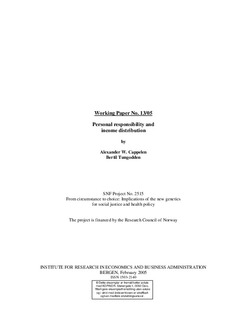| dc.contributor.author | Cappelen, Alexander W. | |
| dc.contributor.author | Tungodden, Bertil | |
| dc.date.accessioned | 2006-06-21T08:01:27Z | |
| dc.date.available | 2006-06-21T08:01:27Z | |
| dc.date.issued | 2005-02 | |
| dc.identifier.issn | 1503-2140 | |
| dc.identifier.uri | http://hdl.handle.net/11250/165420 | |
| dc.description.abstract | Standard welfare economics and optimal tax theory have primarily relied on welfarist theories of distributive justice. An important limitation of welfarist theories is that they are unable to incorporate considerations of personal freedom and responsibility. So-called liberal egalitarian theories of justice have become an important alternative to the welfarist framework. The aim of these theories is to combine the ideal of personal autonomy and responsibility with the ideal of equality. In this paper, we present the main features of the liberal egalitarian framework and discuss how these theories differ from other major traditions of distributive justice. We also discuss implications of liberal egalitarian ethics for redistributive policies, and argue in particular that this perspective may contribute to a better understanding of the limitations inherent in standard income tax systems. | en |
| dc.format.extent | 227579 bytes | |
| dc.format.mimetype | application/pdf | |
| dc.language.iso | eng | en |
| dc.publisher | SNF | en |
| dc.relation.ispartofseries | Working paper | en |
| dc.relation.ispartofseries | 2005:13 | en |
| dc.title | Personal responsibility and income distribution | en |
| dc.type | Working paper | en |
